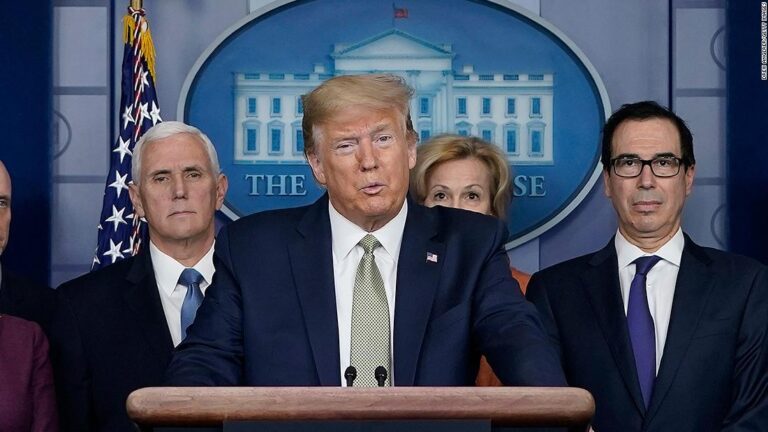In a surprising pivot from its hallmark “America First” stance, the Trump administration has moved to provide substantial financial support to Argentina amid the South American country’s escalating economic crisis. This decision, detailed in a recent report by National Review, underscores a complex balancing act between domestic priorities and broader geopolitical considerations. As Argentina grapples with soaring inflation and mounting debt, Washington’s intervention raises questions about the evolving parameters of U.S. foreign policy under President Donald Trump’s leadership.
America First Policy Faces Test in Argentina Bailout
Despite the administration’s “America First” mantra, recent moves signal a pragmatic shift in confronting global economic instability. The decision to extend significant financial support to Argentina amidst its economic turmoil illustrates a nuanced approach where strategic interests supersede ideological rigidity. This bailout aims to prevent broader contagion effects that could spill over into U.S. markets, especially concerning commodities and trade relations critical to national interests. Officials emphasize that stabilizing Argentina is not pure altruism but a calculated effort to maintain regional influence and protect American investments.
Key factors driving this decision include:
- Preventing debt crisis repercussions that can destabilize international financial systems.
- Securing U.S. leverage against Chinese economic expansion in Latin America.
- Protecting American agricultural exports linked to Argentina’s market.
| Aspect | Impact on U.S. | Administration Stance |
|---|---|---|
| Economic Stability | Mitigates regional financial crisis | Supportive but cautious |
| Geopolitical Influence | Counters rival powers in Latin America | Strategic priority |
| Trade Security | Protects export channels | Highly prioritized |
Strategic Interests and Economic Calculations Behind the Trump Administration’s Decision
At first glance, the Trump administration’s support for Argentina appears to contradict its “America First” agenda. However, a closer analysis reveals a calculated approach driven by deeper strategic and economic considerations. Backing Argentina, a key player in South America, reinforces U.S. influence in a region where China and Russia have steadily expanded their presence. This move ensures that Washington retains leverage in critical geopolitical arenas, securing alliances that could be pivotal in global negotiations ranging from trade to security.
Economic incentives also weigh heavily in Washington’s calculus:
- Protecting American investments in Argentina’s energy and agricultural sectors
- Bolstering a market critical for U.S. exports while providing a bulwark against Chinese economic penetration
- Mitigating risks to global financial markets by stabilizing Argentina’s precarious economy
| Factor | Impact |
|---|---|
| Argentine Debt Relief | Reduces chances of default, stabilizing markets |
| Energy Partnerships | Enhances U.S. energy exports and infrastructure |
| Geopolitical Positioning | Blocks adversaries’ influence in Latin America |
Recommendations for Balancing Domestic Priorities with Global Financial Commitments
Maintaining a delicate equilibrium between domestic priorities and global financial responsibilities requires nuanced policy-making that places American interests at the forefront. Policymakers must ensure that international financial aid-such as the bailouts to struggling economies like Argentina-does not come at the expense of urgent national concerns like infrastructure investment, job creation, and social welfare programs. This means leveraging foreign aid to reinforce strategic alliances and economic partnerships that can yield reciprocal benefits, thus linking international commitments directly to domestic growth.
Several key strategies can guide this balance effectively:
- Rigorous economic impact assessments: Evaluating how aid packages influence both the recipient country’s stability and American economic interests before approval.
- Transparent budget allocations: Public disclosure of how funds are deployed globally, ensuring taxpayer money is spent judiciously.
- Conditional assistance agreements: Tying financial support to tangible reforms and commitments that align with U.S. geopolitical goals.
| Priority Area | U.S. Benefit | International Commitment |
|---|---|---|
| Economic Stability | Market Access & Trade Growth | Financial Aid & Structural Reform |
| Security Cooperation | Regional Stability | Counterterrorism Support |
| Infrastructure Development | Job Creation Domestically | Joint Public-Private Initiatives |
Concluding Remarks
In navigating the complex contours of international diplomacy and economic strategy, the Trump administration’s decision to support Argentina underscores a nuanced approach that transcends the simplistic framing of “America First.” While the move may appear at odds with protectionist rhetoric, it reflects a calculated effort to stabilize a key regional partner and protect broader U.S. interests in the Western Hemisphere. As the situation evolves, the true impact of this intervention on both countries’ futures will continue to unfold, offering insight into the practical limits and flexibilities within America’s foreign policy under the current administration.




